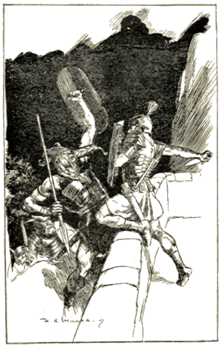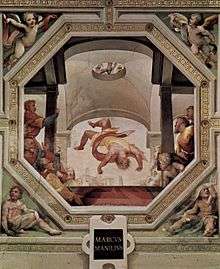Marcus Manlius

Marcus Manlius Capitolinus (died 384 BC) was consul of the Roman Republic in 392 BC.[1] He was the brother of Aulus Manlius Capitolinus. The Manlii were a patrician gens.
During the Gallic siege of Rome in 390 (or 387) BC, the account of which became partly mythologized, Marcus Manlius held out for months with a small garrison on the citadel (arx), while the rest of Rome was abandoned. When Gauls under the command of Brennus were attempting to scale the Capitoline, Manlius was roused by the cackling of the sacred geese, rushed to the spot, and threw down the foremost assailants.[2]

After the sack of Rome left the plebeians in pitiful condition, they were forced to borrow large sums of money from the patricians, and once again became the poor debtor class of Rome. Manlius, the hero of Rome, fought for them. Livy says, with some inaccuracy, that he was the first patrician to act as a populist (popularis). Seeing a centurion led to prison for debt, he freed him with his own money, and even sold his estate to relieve other poor debtors, while he accused the Senate of embezzling public money. He was charged with aspiring to kingly power, and condemned by the comitia, but not until the assembly had adjourned to a place outside the walls, where they could no longer see the Capitol which he had saved. The Senate condemned him to death in 385 BC, and he was thrown from the Tarpeian Rock one year later.[3] He is considered the second martyr in the cause of social reform at Rome.[4]
His house on the Capitoline Hill was razed, and the Senate decreed that no patrician should live there henceforth. The Manlii themselves resolved that no patrician Manlius should bear the name of Marcus. According to Mommsen, the story of the saving of the Capitol was a later invention to justify his cognomen, which may be better explained by his domicile.
References
- ↑ T.R.S. Broughton: The Magistrates Of The Roman Republic. Vol. 1: 509 B.C. - 100 B.C.. Cleveland / Ohio: Case Western Reserve University Press, 1951. Reprint 1968. (Philological Monographs. Hrsg. von der American Philological Association. Vol. 15, 1), p. 92
- ↑ Livy v. 47; Plutarch, Camillus, 27.
- ↑ Livy vi. 14-20
- ↑ For a summary of these events, see Finley Hooper, Roman Realities (Wayne State University Press, 1979), p. 53ff.
| Political offices | ||
|---|---|---|
| Preceded by Lucius Lucretius Tricipitinus Flavus (Suffect) Servius Sulpicius Camerinus (Suffect) |
Consul of the Roman Republic with Lucius Valerius Potitus Poplicola II 392 BC |
Succeeded by Consular tribunes |